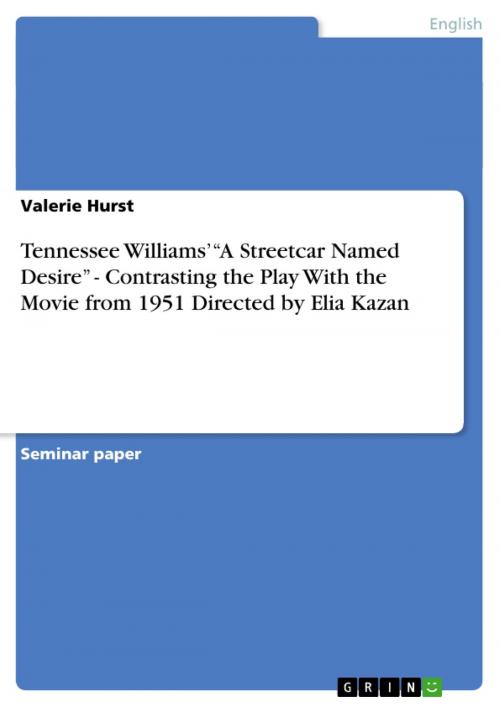Tennessee Williams' 'A Streetcar Named Desire' - Contrasting the Play With the Movie from 1951 Directed by Elia Kazan
Contrasting the Play With the Movie from 1951 Directed by Elia Kazan
Fiction & Literature, Literary Theory & Criticism, British| Author: | Valerie Hurst | ISBN: | 9783640538171 |
| Publisher: | GRIN Publishing | Publication: | February 16, 2010 |
| Imprint: | GRIN Publishing | Language: | English |
| Author: | Valerie Hurst |
| ISBN: | 9783640538171 |
| Publisher: | GRIN Publishing |
| Publication: | February 16, 2010 |
| Imprint: | GRIN Publishing |
| Language: | English |
Seminar paper from the year 2009 in the subject English Language and Literature Studies - Literature, grade: 1,8, University of Tubingen (Englisches Seminar), course: Introduction to Literary Studies, language: English, abstract: ''The marvelous performances in [this] great movie [...] [are] only slightly marred by [a] Hollywood ending.' Tennessee Williams' (cf. Yacowar). Tennessee Williams' play 'A Streetcar Named Desire' from 1947 was often staged and interpreted. It was also the base of Elia Kazan's famous and remarkable movie from 1951. Since a book allows for interpretation, the movie features a different realization. This paper will contrast the written form with the film version. To illustrate the different realizations there will be a closer look at the two special and important scenes, ten and eleven, which are exemplarily for the differences in the general conversion. The decision for exactly these scenes is founded in the striking differences in conversion and adaptation and by reason of plenty of content rapidly beat down in these scenes. Due to many influences, the film departs in places completely from Williams' original. These influences and differences will be described in the following first part. Particular attention will then be paid to the music and noises, and the moods and emotions caused by these. And, due to being close linked to the adaptation of the whole movie, the effects of censorship will be explained. The impact is to work out in which ways the movie is adapted to the play and where it distinguishes from it.
Seminar paper from the year 2009 in the subject English Language and Literature Studies - Literature, grade: 1,8, University of Tubingen (Englisches Seminar), course: Introduction to Literary Studies, language: English, abstract: ''The marvelous performances in [this] great movie [...] [are] only slightly marred by [a] Hollywood ending.' Tennessee Williams' (cf. Yacowar). Tennessee Williams' play 'A Streetcar Named Desire' from 1947 was often staged and interpreted. It was also the base of Elia Kazan's famous and remarkable movie from 1951. Since a book allows for interpretation, the movie features a different realization. This paper will contrast the written form with the film version. To illustrate the different realizations there will be a closer look at the two special and important scenes, ten and eleven, which are exemplarily for the differences in the general conversion. The decision for exactly these scenes is founded in the striking differences in conversion and adaptation and by reason of plenty of content rapidly beat down in these scenes. Due to many influences, the film departs in places completely from Williams' original. These influences and differences will be described in the following first part. Particular attention will then be paid to the music and noises, and the moods and emotions caused by these. And, due to being close linked to the adaptation of the whole movie, the effects of censorship will be explained. The impact is to work out in which ways the movie is adapted to the play and where it distinguishes from it.















